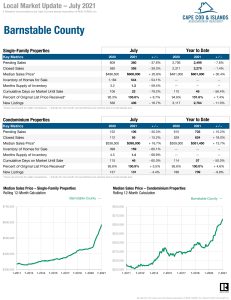BY MARO V. TITUS
The real estate market has become so grueling, it’s the subject of “Saturday Night Live” sketches! Realtors are experiencing unprecedented behavior with their buyer and seller clients. Here, a few local industry leaders share their perspectives on how best to navigate these uncharted residential waters.
Our Changing Realty Climate

COURTESY CAPE COD & ISLANDS ASSOCIATION OF REALTORS
Barnstable County real estate statistics
The Cape Cod and the Islands Association of Realtors (CCIAOR) is the local, not-for-profit organization supporting realtors across Cape Cod, Martha’s Vineyard and Nantucket. Part of the association’s mission is to embrace change and empower expertise, enabling realtors to operate and advance a property owner’s ability to transfer property. These are busy times at CCIAOR. Association President and Cape Cod and the Islands multiple listing service (CCIMLS) at-large director, Annie Blatz empathizes with the current agent experience: “When working with a buyer, agents may write up several offers with a client and not be successful.” Buyer fatigue is on the rise, the struggle is real and the luxury of time to decide has dissipated. Ms. Blatz recommends expanding your options—timewise, geographically and in the type of property sought. Flexibility has always been key to a successful real estate search, now more than ever. A realtor for 36 years, Ms. Blatz attributes the state of the market to the pandemic, but not entirely. “The pandemic is not the only ingredient. It’s created a culture shift that’s caused people to reevaluate their lives,” she said.
Proof of those changing outlooks is evident in subtle but persistent trends. Jack Driscoll, branch executive with Kinlin Grover Compass, finds a new demographic of second-home buyers: “These buyers are younger now; majority attendance at most open houses are prospects under the age of 50 years,” he said. The paradigm shift in how Americans are spending their 9-to-5 existence has increased the expectations on the single-family home. Home Sweet Home is now Home Office Home. Working-age buyers are focusing on the proximity of Boston and other cities over the bridge where an office in-person visit may occasionally arise, but with most of their work time spent at home.
Consequently, SUVs that were packed for a post-Labor Day return to greater Boston remain on the Falmouth streets for three to four seasons now. On the alternative side, sellers are older, moving out, downsizing…none of which is a new concept, Mr. Driscoll notes. “It’s accelerated the process,” he said. Ms. Blatz agrees: “On Cape Cod we were the beneficiaries of people deciding they wanted to live a different lifestyle.” Seasonal in nature, Barnstable County is nonetheless a microcosm of a national phenomenon. Mr. Driscoll describes the Cape as being within a “protective bubble,” created by limitations of insufficient new home construction, zoning laws that have been on the books for decades and not much land on which to construct new homes.
CCIAOR data illustrate these trends. Traditionally, June is one of the top three listings months of the year, yet June 2021 marked the lowest level of new listings in the past 18 years. Year to date (as of July 2021) there is a 26.7 percent increase in the median price of a single-family home in Falmouth ($665,000, up from $525,000 in 2020). As prices rise and bidding wars have become an expectation, across Barnstable County availability remains on the decline. Inventory of homes for sale has dropped 54.1 percent from July 2020 to July 2021. Similarly, we’re seeing homes going quicker—year over year, homes had been on the market for 110 days; now it is merely 48 days.
Proceed With Caution
 There’s extraordinary temptation to cut corners on the process on the buying side and to jump in prematurely on the selling side. Experts caution against these gestures. Mark Twichell has been a realtor for 21 years, the most recent five years here on the Cape, where he also serves as a new agent mentor at Kinlin Grover Compass. When asked about pitfalls to avoid, Mr. Twichell offered tips for both sides of the realty equation. “If there’s any doubt about selling, don’t. Rentals are scarce in this area, and it’s difficult to buy up from a rental given pricing. I don’t think it’s a bad thing if you can wait a year, then jump in,” he said.
There’s extraordinary temptation to cut corners on the process on the buying side and to jump in prematurely on the selling side. Experts caution against these gestures. Mark Twichell has been a realtor for 21 years, the most recent five years here on the Cape, where he also serves as a new agent mentor at Kinlin Grover Compass. When asked about pitfalls to avoid, Mr. Twichell offered tips for both sides of the realty equation. “If there’s any doubt about selling, don’t. Rentals are scarce in this area, and it’s difficult to buy up from a rental given pricing. I don’t think it’s a bad thing if you can wait a year, then jump in,” he said.
Sellers in the best position are those who are leaving the area altogether, as selling one’s way into a precarious housing situation has also become the norm. “Relying on profits from your home sale to secure another is very risky,” Mr. Twichell advises. On the buyer side, waiving home inspections has become a big issue. Most agents, including Mr. Twichell, advise their buyer clients against this practice. Broken appliances, left undiscovered without a home inspection, can end up costing the prospective homeowner a lot. “My concern is that people who waive inspections don’t even look in the attic or chimney and miss things,” he said. This is yet another aspect of the crucial “counseling role” agents must perform for their clients. “People are in a panic to buy something,” Mr. Twichell said. “I have counseled several people who were nervous about being priced out. They’re settling, whereas they normally would’ve waited.”
Still A Highly Regulated Environment
These trends and the resulting behavior change on the part of buyers and sellers can leave a staggering impact on real estate agents. When asked how he handles onboarding new agents, Mr. Twichell explained, “During the pandemic I’ve become more of a counselor, teaching people how to overcome problems, having more discussions with those I mentor about process, to be careful and avoid missing a step along the way.” With 23 federal laws impacting the real estate process, there are more steps to follow than industry outsiders would imagine. Ms. Blatz said that despite this challenging market, CCIAOR has not had need to increase its agent oversight.
“People are not breaking rules. The biggest regulatory change recently surrounds Fair Housing,” Ms. Blatz said, noting the Diversity Task Force created within CCIAOR. Local, state and national real estate associations are all heightening awareness of Fair Housing practices. Longstanding customs like “love letters” from prospective buyers are a fading trend, in part for their potential to create bias in the transaction.
Where Do We Go From Here?
When asked to consult his realty crystal ball and predict the future, Mr. Driscoll noted that we are starting to see price adjustments in a downward direction. “By early spring 2022, hopefully things will level off,” he said. Many agree that current market conditions will prevail well into next year. Mr. Twichell is among them. “The only thing that’ll change [the market] back and slow the buying frenzy will be increased inventory, which will relax pricing,” he said. Inventory may be showing signs of life, but it is still not restored to full health. Scarcity is experienced nationally but seems slightly worse in seasonal communities.
Ms. Blatz notes that, with approximately 2,800 licensed agents on the Cape, in an already tough market, this may not be the optimal time to pursue a career in real estate. She sees the current situation as busy brokerages retaining that status, a small percentage of agents doing the largest percentage of business, while newer agents fight their way in. Mr. Twichell agreed that we have lost a lot of agents in this trying business climate, hoping some will opt to return in time. The good news is when they do, Mr. Driscoll predicts, “We’ll find that prices will hold.” Considering lifestyle, safety and overall quality-of-life factors, “property here on the Cape will maintain its value.”

